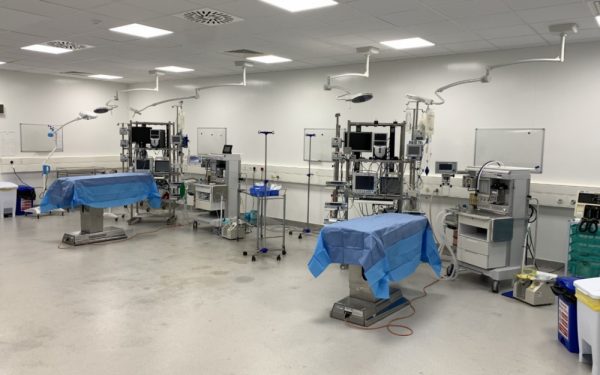
LARIF is a world-leading research facility that is dedicated to translational and livestock research in large animals, and well-equipped to translate medical breakthroughs into treatments for human patients.
It offers advanced imaging techniques including MRI, CT, Fluoroscopy and Ultrasound. The facility has two operating theatres for general anaesthesia and surgery of large animals; twin isolation suites that allow work with category two pathogens; and a Critical Care Unit for prolonged anaesthesia and intensive care. In addition to these technical services, there is also expert animal care 24 hours a day, seven days a week.
LARIF allows users to capitalise on a wide range of expertise in farm animal production, health and welfare, including infectious diseases and zoonoses, vaccines, genome editing, embryology, lentivirus (gene therapy vectors), imaging, radiology, medicine, surgery, and critical care. The research undertaken in this facility is within the one health framework, which recognises the link between human, animal, and environmental health.
LARIF has a large biomedical models portfolio to develop new treatments and medical technologies in pig, sheep and cattle, covering many sectors including cardiology, oncology, neurology and immunology.

In the investigation of inflammatory disease LARIF has provided support to numerous translational projects using large biomedical models in Acute Respiratory Distress Syndrome (ARDS), Lung inflammation, septic peritonitis, and E.coli urinary tract infection. The Acute Respiratory Distress Syndrome (ARDS) model enabled two separated companies to investigate novel diagnostics and therapeutics and one academic consortium to validate a novel diagnostic approach to lung inflammation and fluid leak, for use in ARDS and Covid-induced lung injury.
In conjunction with different academic groups at the University, a pig model of anastomotic leak was used to test prototype implantable biosensors to detect septic peritonitis.
With LARIF specialist support, Personal Chair of Microbial Genetics Professor David Gally has developed a pig model of E. coli urinary tract infection to study antimicrobial resistance (AMR) using enteric bacteria and microbiome-based approaches to limit antibiotic use and minimise AMR emergence and spread.
Research in diagnostics includes a Wellcome Trust-funded project to replace endoscopes with novel capsule-based sensors to diagnose and treat diseases as IBD.
Find out how you can work with the University’s world-class inflammation expertise, gain access to our facilities and specialist technical expertise in these sectors.
University of Edinburgh video describing the facilities and services available

Find out how you can work with the University’s world-class inflammation expertise and state of the art facilities that will provide the solution to your research questions.

We make it easy to access the University of Edinburgh's multi-disciplinary expertise by matching your needs to the latest research, new technologies and world-class facilities.